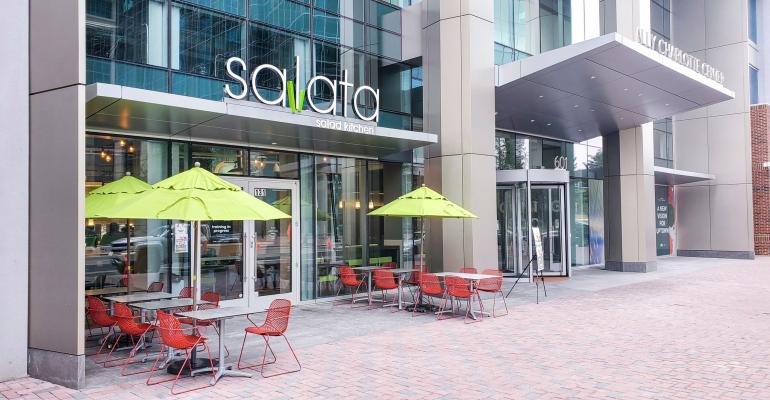Michelle Bythewood joined the Salata salad chain as chief marketing officer a little over five years ago. She fell in love with the brand, but wanted to do more to help it grow. So, she asked the founder, Berge Simonian, if she could be president.
“I saw this potential of a growing mom-and-pop brand to a national company, and I needed to do more than marketing. Yes, marketing is my passion, but I could do that in my sleep. The only role I saw where I could do more was president,” Bythewood said during a recent interview. “[Simonian] took a chance on me, and we were off and running.”
Founded in 2005, Houston-based Salata now has about 90 units in five states, and has experienced a steady pace of growth since Bythewood took the reins. In late 2019, Salata rolled out a tech stack that included online ordering, an app and a new point-of-sale system, which positioned the chain relatively favorably during the throes of the pandemic. Bythewood also led the company through a complete rebranding, including a new logo, feel and restaurant design. In 2021, she brought Julie Davis on board as vice president of franchise development, which brought that whole “off and running” idea to a whole new level.
Last year, Salata hit several weekly sales records and introduced a new initiative aimed at attracting multi-unit operators. This year, the company is expected to surpass sales and development records.
“We are on track to open 17 units this year. I think we’re going to kill that number. And, right now we’ve got about 20 new commitments out there and a robust pipeline,” Davis said. “We’re doing fun stuff.”
The Salata team has facilitated those commitments by bringing the development services in house, identifying growth opportunities based on supply chain, population, lack of competition, etc., and studying how its guests use the brand. It has also removed back-of-house equipment customization and complexities.
“We knew we wanted to find an equipment vendor who understands unit economics and cut that customization piece out that added costs. This is why it was important for us to start managing the vendors, to make sure we’re delivering the best costs,” Davis said. “We were using third-party services, but if my job is to deliver the best unit economics for our franchisees, I can’t do that if someone else is controlling the process.”
The guest research piece has also shifted the brand’s approach. Salata’s legacy restaurants are around 3,000 square feet, for instance, though consumers typically only visit to go down the line; 70% of orders are then consumed off-premises.
“That means we can be more flexible in our restaurant design. Our line isn’t going to change. It’s been stable for 17 years. We can build the line all day long and be mindful of the shell around it. Is it the right size, cost?” Davis said. Salata has since reduced its buildout by about 25%.
These types of moves – vendor control, smaller buildout – are supporting stronger unit economics, Bythewood and Davis said. The goal is to get to a one-to-three ratio; a $500,000 or $600,000 (with tenant improvements) buildout and a $1.5 million average unit volume target. Current average unit volumes are around $1.3 million, and the company is “moving the meter.”
Notably, Salata is one of several salad concepts currently riding the momentum of growing consumer demand for healthier food and the category is becoming more crowded than ever. The Houston-based concept is differentiating itself in a few different ways.
“We’re very different in that we have over 50 fresh ingredients cut fresh every day, 10 lean proteins, 12 dressings made in-house. We have a huge array of customization and choice we’ve done from day one and we have guests that come in five days a week. The amount of people who come in is shocking. It separates us from the pack,” Bythewood said. “Our owner brought the brand to light because he wanted to serve healthy food in a way that wasn’t being offered to the public. This brand is based on health, not a trend.”
Contact Alicia Kelso at [email protected]





